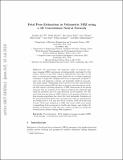| dc.contributor.author | Xu, Junshen | |
| dc.contributor.author | Zhang, Molin | |
| dc.contributor.author | Turk, Esra Abaci | |
| dc.contributor.author | Zhang, Larry | |
| dc.contributor.author | Grant, P. Ellen | |
| dc.contributor.author | Ying, Kui | |
| dc.contributor.author | Golland, Polina | |
| dc.contributor.author | Adalsteinsson, Elfar | |
| dc.date.accessioned | 2021-01-26T15:59:39Z | |
| dc.date.available | 2021-01-26T15:59:39Z | |
| dc.date.issued | 2019-10 | |
| dc.identifier.isbn | 9783030322502 | |
| dc.identifier.isbn | 9783030322519 | |
| dc.identifier.issn | 0302-9743 | |
| dc.identifier.issn | 1611-3349 | |
| dc.identifier.uri | https://hdl.handle.net/1721.1/129568 | |
| dc.description | Part of the Lecture Notes in Computer Science book series (LNCS, volume 11767) | en_US |
| dc.description.abstract | The performance and diagnostic utility of magnetic resonance imaging (MRI) in pregnancy is fundamentally constrained by fetal motion. Motion of the fetus, which is unpredictable and rapid on the scale of conventional imaging times, limits the set of viable acquisition techniques to single-shot imaging with severe compromises in signal-to-noise ratio and diagnostic contrast, and frequently results in unacceptable image quality. Surprisingly little is known about the characteristics of fetal motion during MRI and here we propose and demonstrate methods that exploit a growing repository of MRI observations of the gravid abdomen that are acquired at low spatial resolution but relatively high temporal resolution and over long durations (10–30 min). We estimate fetal pose per frame in MRI volumes of the pregnant abdomen via deep learning algorithms that detect key fetal landmarks. Evaluation of the proposed method shows that our framework achieves quantitatively an average error of 4.47 mm and 96.4% accuracy (with error less than 10 mm). Fetal pose estimation in MRI time series yields novel means of quantifying fetal movements in health and disease, and enables the learning of kinematic models that may enhance prospective mitigation of fetal motion artifacts during MRI acquisition. | en_US |
| dc.description.sponsorship | NIH (Grants U01HD087211, R01EB01733, NIBIB NAC P41EB015902 and NICHD U01HD087211) | en_US |
| dc.language.iso | en | |
| dc.publisher | Springer International Publishing | en_US |
| dc.relation.isversionof | http://dx.doi.org/10.1007/978-3-030-32251-9_44 | en_US |
| dc.rights | Creative Commons Attribution-Noncommercial-Share Alike | en_US |
| dc.rights.uri | http://creativecommons.org/licenses/by-nc-sa/4.0/ | en_US |
| dc.source | arXiv | en_US |
| dc.title | Fetal Pose Estimation in Volumetric MRI Using a 3D Convolution Neural Network | en_US |
| dc.type | Book | en_US |
| dc.identifier.citation | Xu, Junshen et al. "Fetal Pose Estimation in Volumetric MRI Using a 3D Convolution Neural Network."
MICCAI: International Conference on Medical Image Computing and Computer-Assisted Intervention,
Lecture Notes in Computer Science, 11767, Springer, 2019, 403-410. © 2019 Springer Nature Switzerland AG | en_US |
| dc.contributor.department | Massachusetts Institute of Technology. Department of Electrical Engineering and Computer Science | en_US |
| dc.contributor.department | Massachusetts Institute of Technology. Computer Science and Artificial Intelligence Laboratory | en_US |
| dc.contributor.department | Massachusetts Institute of Technology. Institute for Medical Engineering & Science | en_US |
| dc.contributor.department | Harvard University--MIT Division of Health Sciences and Technology | en_US |
| dc.relation.journal | Lecture Notes in Computer Science | en_US |
| dc.eprint.version | Original manuscript | en_US |
| dc.type.uri | http://purl.org/eprint/type/ConferencePaper | en_US |
| eprint.status | http://purl.org/eprint/status/NonPeerReviewed | en_US |
| dc.date.updated | 2020-11-20T17:30:05Z | |
| dspace.orderedauthors | Xu, J; Zhang, M; Turk, EA; Zhang, L; Grant, PE; Ying, K; Golland, P; Adalsteinsson, E | en_US |
| dspace.date.submission | 2020-11-20T17:30:09Z | |
| mit.journal.volume | 11767 | en_US |
| mit.license | OPEN_ACCESS_POLICY | |
| mit.metadata.status | Complete | |
